Choosing the right keywords for your Content is fundamental to getting great results, but the process can be overwhelming and time-consuming - but not anymore!
Formerly known as Topic Explorer, Surfer's Topical Map is here to help you with finding new article ideas, filling out any gaps in your content, and building your Topical Authority. 
Here's Jakub Sadowski, Topical Map's Product Manager, explaining what it is and how it works:
In a nutshell, Topical Map identifies new opportunities for your content by analyzing your topical coverage and finding “neighbor” topic clusters based on semantic similarity.
This means we can offer more accurate suggestions on what you should write next and a clear overview of your current status and progress.
With Topical Map, you get to:
Review your current topical coverage at a glance with Topics Visualization.
Quickly identify gaps in your Content and see what to work on next.
Speed up your Keyword selection process and get instant Article ideas with clusters you have not covered yet.
Consult and compare your competitor's topical coverage.
Check if the main keyword under the Topic Cluster matches your search intent.
Monitor your page positions (GSC integration required).
And, of course, boost your Topical Authority.
Inside Topical Map, you will find All Topics and Map tabs, each one designed to cover a different focus. If it's your first time using this tool, you will need to configure your Topical Map projects from your Sites Project Page.
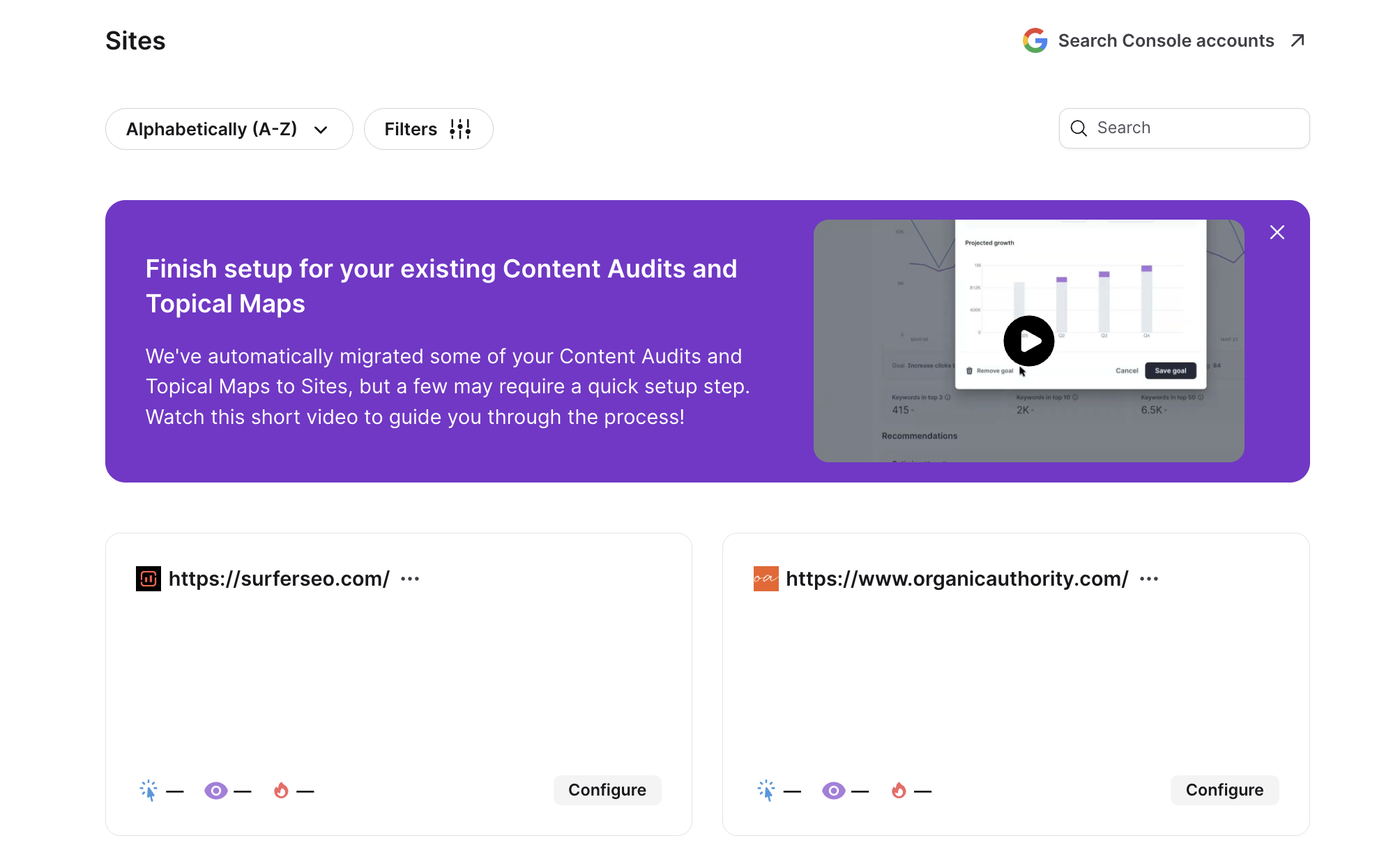
Once you've configured your domain, you'll be automatically redirected to your Sites Dashboard.
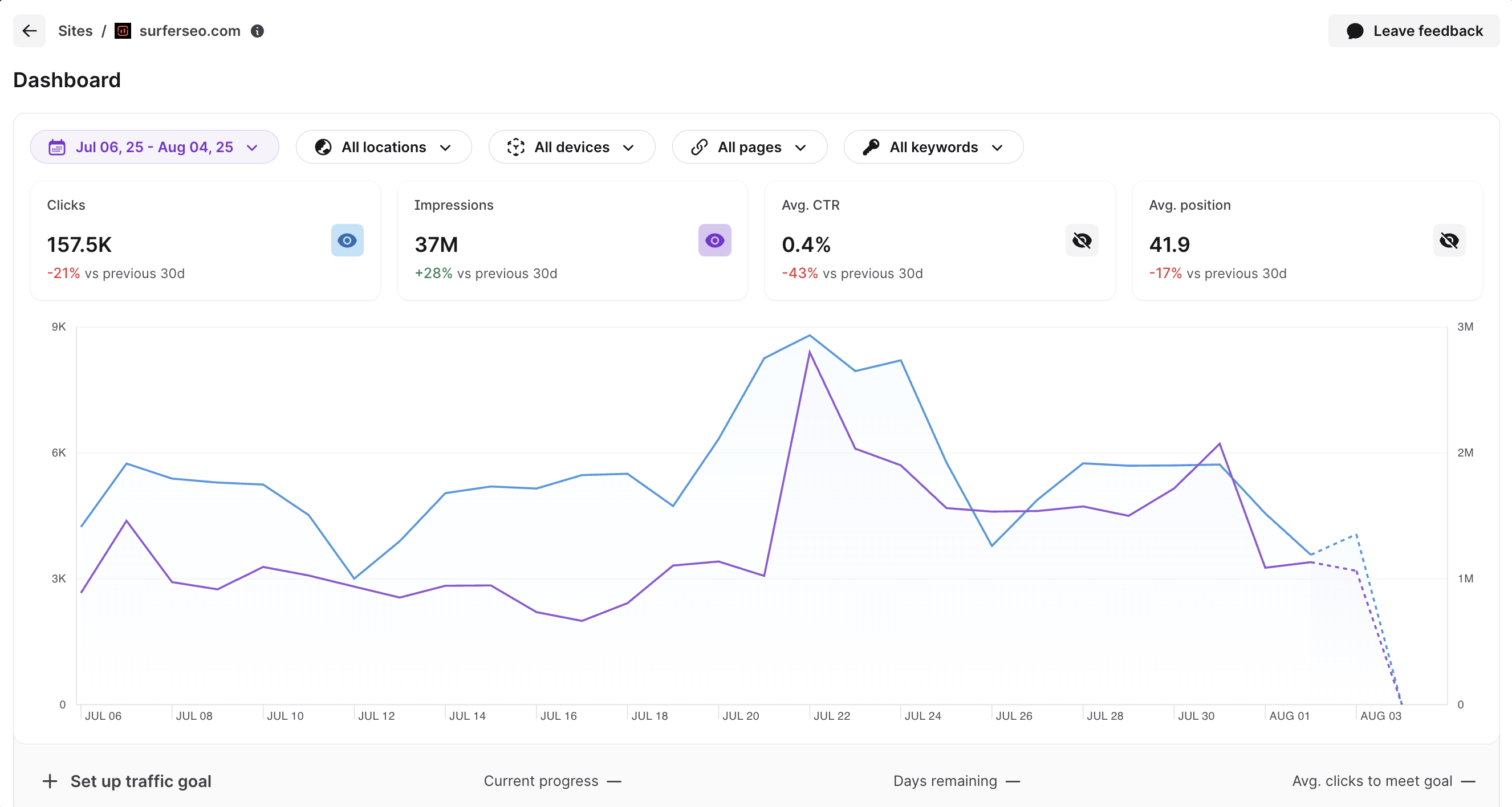
From there, you can expand the left Toolbar panel and click on Topical Map.

And it should automatically show you both Topic Clusters and Main Keywords.
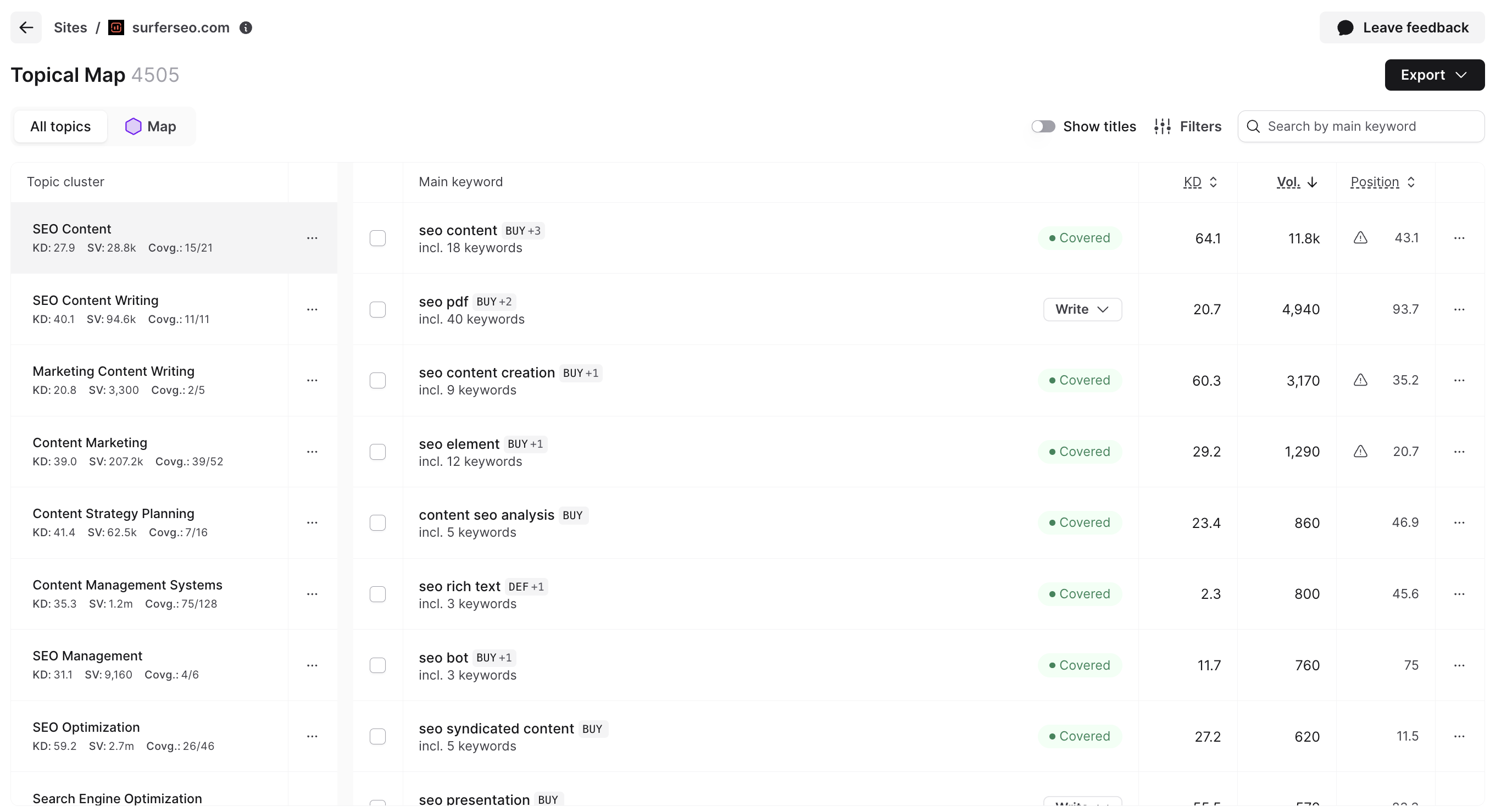
 Now, let's explore all the ways to explore new topics:
Now, let's explore all the ways to explore new topics:
This is your best option as it offers more accurate suggestions and insights based on your Google Search Console data, along with an overview of your topical authority to understand your strengths and areas of improvement better.
Some of the helpful functions you get when using the All Topics tab:
URL positions
See their actual topical coverage
Track ongoing work (mark articles as covered and new article ideas)
Find gaps in their content by analyzing what you are missing and getting new article ideas.
It works by fetching Keywords from your GSC console data and clustering them to build a map of your domain. Next, we take the top Keyword by CTR (click-through rate) and Impressions to search for “neighbor” clusters based on semantic similarities.
One of the great things about Domain is that it is not limited to working with one domain. You can connect multiple domains and create a Topical Map for each one, with auto-updates and refreshes every 14 days to reflect your ongoing work and changes in SERP.
To start, you must enable the Google Search Console integration by connecting the account with the verified Domain. Remember, the email account can be different from your Surfer-registered email.
Once the integration is enabled, you'll get a list of available domains when selecting Topical Map. Choose the one you wish to work with and select the location.
We currently support 23 countries, which are the ones most requested. When selecting the location, you'll only see the countries where you get the most traffic according to the last 30 days of your Google Search Console data. If the desired location is not available, we recommend using the Topic Research instead.
Let's give it a few minutes while we fetch the data and get things ready to start working on your domain.
All articles: Display all the articles covered and not covered, which is the default view. And because some of them could be covered, you’ll see the Positions column.
New articles: Those are the articles and clusters you have yet to cover. So, spotting the full list of articles you should work on next is easier. Because these articles are not covered yet, instead of seeing the positions, you get Topics.
Select in bulk: You can now select multiple articles at once to archive or create CE and AI articles in bulk (below is the amplified screenshot for the pop-up menu when selecting one or more articles).

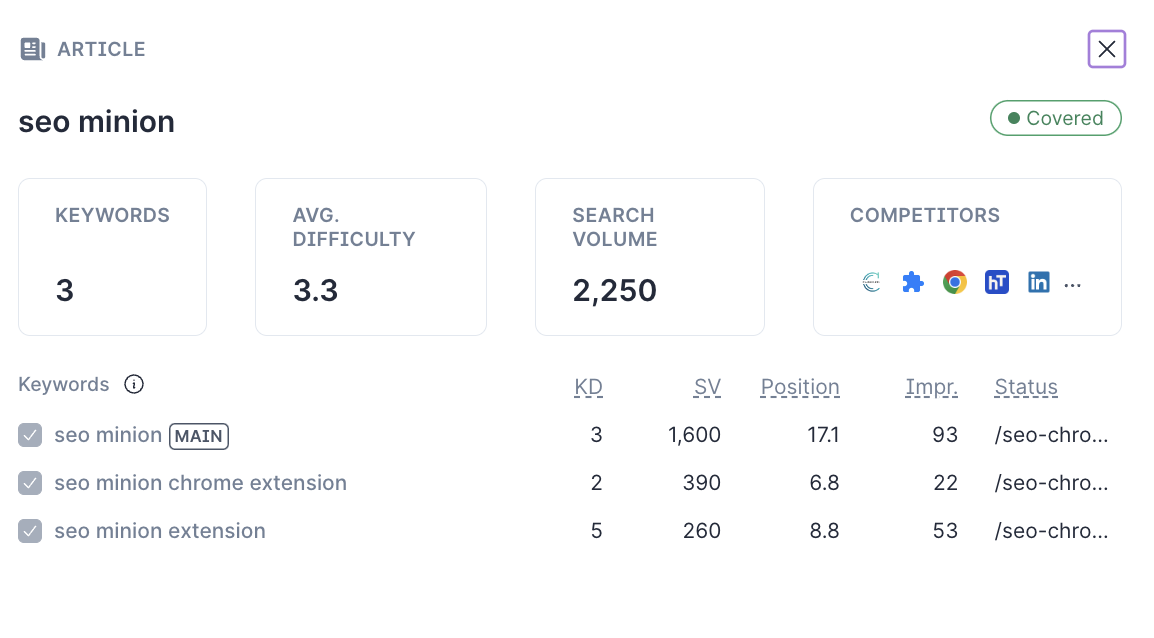
The figures shown at the top for keywords, average difficulty, and Search Volume refer to the overall cluster.
Then, you have the breakdown with numbers for each keyword, including the Position, impression, and the URL (Status) where the given keyword is included.
Competitors: By clicking the icons, you can consult the competitor's article ranking for the keywords in the cluster.
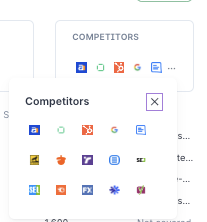
Filters: We also included our traditional Difficulty and Search Volume filter option. Plus, here’s where you can see up to 100 pages ranking for that Topic. You can use the input field to quickly search for the competitor you wish to compare yourself against.
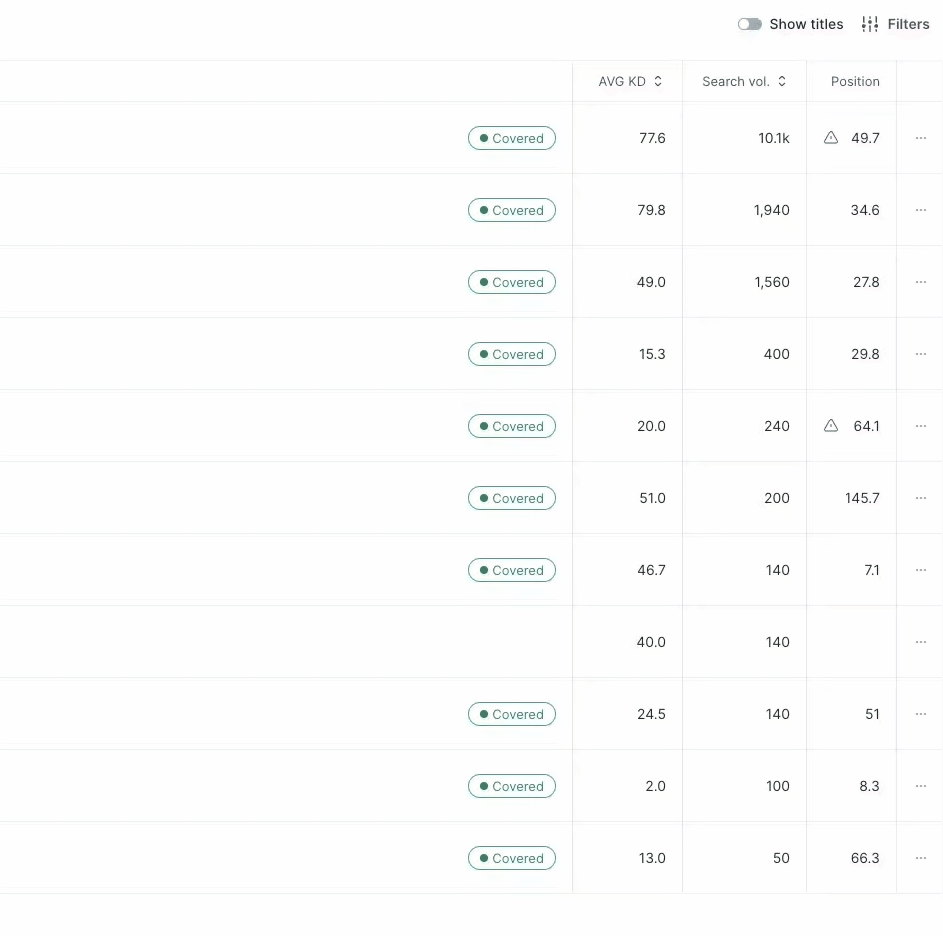
Topics Visualization
It's the perfect complement for having a better sense and understanding of your current topical coverage.
On the graph, the hexagons and colors represent as follows:
Grayed out - means it's filtered out
Big hexagon on middle - topic
Small hexagon - articles
You have two primary filters represented by color shade.
Avg. difficulty (graded from white to purple, where purple represents the most difficulty)
Cluster coverage (purple - covered) (white - not covered)
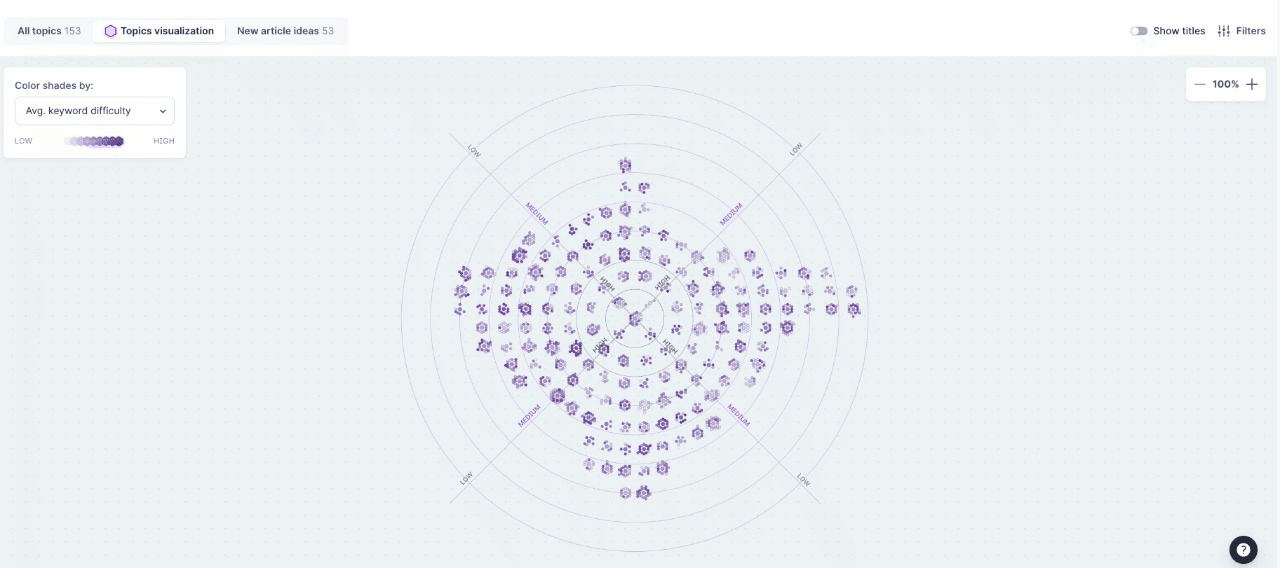
The cluster in the center is the closest to your initial input (if you typed in the keyword) or to your best keyword on GSC. Then, neighbor clusters are ordered from high (closest in semantic similarity) to low.
You also get our regular filters:
Difficulty
Search volume
Competitors: You could either select from the list or add another competitor and consult how they are doing
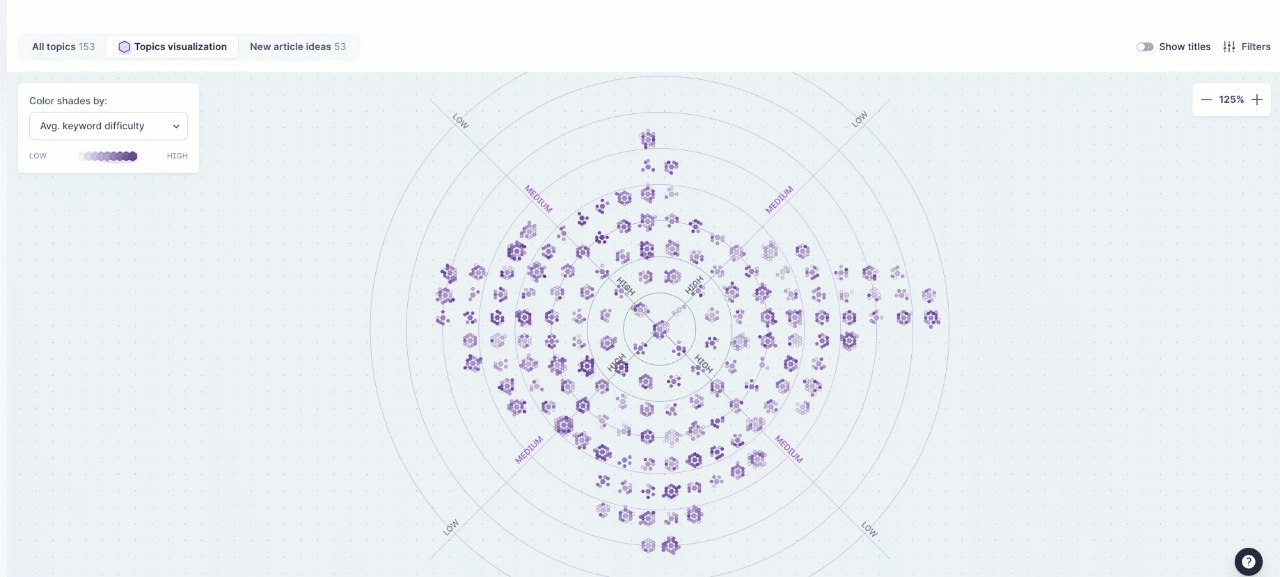
Now, under a separate tab under Tools, and initially a part of Topical Map during its release, Topic Research is a great alternative for exploring article ideas without a verified domain. While it does not require Google Search Console, it also means that some functions won’t work, such as:
Status: shows if a keyword is covered and which URL is included
Positions: the page position for a given keyword.
New article ideas: shows which articles are not covered yet
Topics Visualization: Coverage
Topic Research and Keyword Research can now be found directly in your dashboard as independent tools. These tools are not available for all plans. For detailed features & pricing breakdown, check here.
Yes. We primarily fetch keywords from your domain, taking into account impressions and click-through rates. Due to that, smaller or newer domains will need to put in extra effort to boost their content before they can use Domain Map. We recommend conducting Keyword Research first for this purpose.
This is only possible with Google Search Console integration. Articles automatically show a Covered status when you cover at least 3 keywords (for clusters with more than 10 keywords) or 30% of the keywords (when there are less than 10 keywords in the cluster).
We currently support 23 countries with the most Keyword Research usage:
United States
Poland
Austria
Canada - EN
United Kingdom
Venezuela
Australia
Czechia
Hungary
New Zealand
Switzerland - DE
Mexico
Finland
Brazil
Singapore
Spain
Italy
India - EN
Sweden
Germany
Denmark
France
Netherlands
You can only get the locations from the countries you are currently ranking for.
This is a hint indicating you need to optimize your domain because multiple of your URLs are ranking for the same keywords.
Our team recently implemented a new improvement that gets fresh data for queries in Topic Explorer. So queries created before April 1st need to be recreated as those are no longer compatible with the new logic 
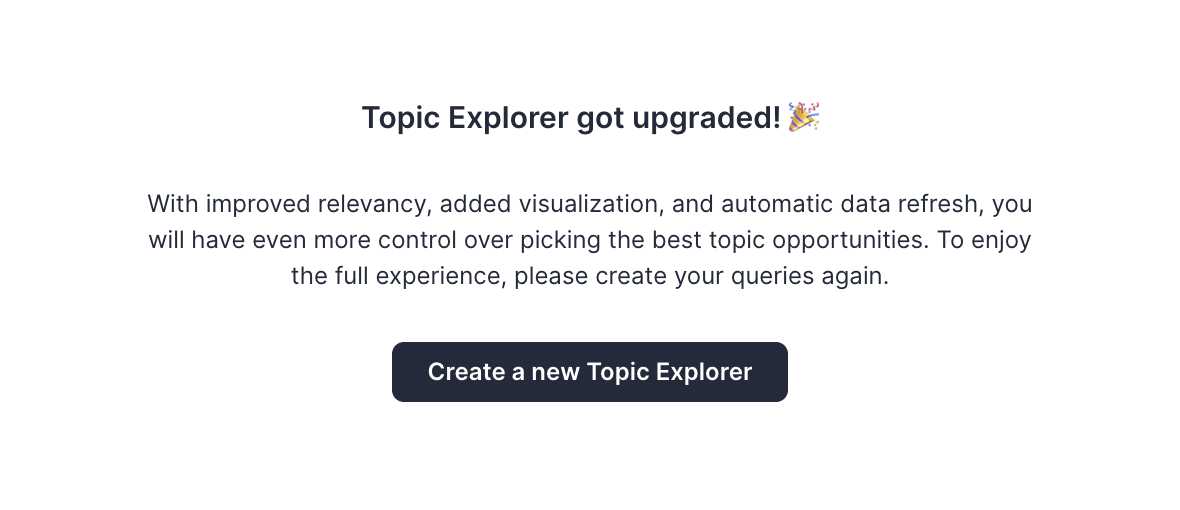
 Do you still need help? You can reach us at [email protected] or by clicking on the chat icon in the bottom-right corner. We're here 24/5!
Do you still need help? You can reach us at [email protected] or by clicking on the chat icon in the bottom-right corner. We're here 24/5! 